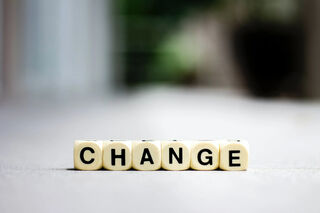Flow
Why "Getting Back to Normal" Can Be Counterproductive
By refusing to accept change, we are often doing ourselves more harm than good.
Posted March 31, 2021 Reviewed by Davia Sills
Key points
- We can look to our parents' or grandparents' generations for proof that "normal" is a concept that doesn't really exist.
- Being reverent about life changes and closing chapters can be very healthy.
- Embracing change and going with the flow makes it easier to stay positive and productive no matter what our age.
There’s probably not one person on the planet who hasn’t been affected by everything that’s transpired over the course of the last year. Many have suffered great losses. Others have had to totally upend their lives in order to survive (figuratively and/or literally). We’ve had to change the way we’ve thought about socializing, shopping, and in some cases, even how we stocked up on toilet paper.

The one constant has been no constant at all. Change was the order of the day. Perhaps there were occasions we thought we’d never get through, learn to accept, or even survive. Yet here many of us are, looking to what we hope is light at the end of the pandemic tunnel. But after all we’ve been through, all we’ve learned to cope with, and all we’ve survived, why would our collective mantra be, “Let’s get back to normal”?
“Normal” hasn’t existed for a long, long time. We can look to our parents' or grandparents' generations for proof of that.
Just think of all the changes that occurred over the 10 years before the pandemic, and your head might spin. Social media, streaming services, and driverless vehicles that are an essential part of life haven’t been around for long. But we’ve adapted to them, accepted them, and now utilize them in various and even (sometimes) productive ways. So why should the new post-pandemic world be any different?
Even with what seems to be hope for an eventual conclusion to much of pandemic-related life as we know it, we have to wonder if everyday occurrences like blowing out birthday candles and then serving the cake to everyone who didn’t blow on it will ever be a thing again. Heck, most of us have even learned to recognize “smiling eyes” (above a face mask) even when we can’t see someone’s mouth grinning from ear to ear. Sure, some familiar ways of doing things will seep back into our daily lives. But others will not. And we can choose to be OK with this evolution or choose to mourn the losses.
There’s nothing wrong with mourning, of course. Being reverent about life changes and closing chapters can be very healthy. But there will still be a time to accept and move on—and no longer live in (or yearn for) the past.
For many who’ve orchestrated our own major life changes, this might be a more familiar concept. Perhaps a spouse who never thought he or she could thrive outside of marriage has discovered he or she can. Maybe a person facing a crippling injury is showing the world that someone in a wheelchair can dance. I, myself, once weighed over 450 pounds and, after losing the excess weight with the help of healthier eating and exercise, discovered nothing about my life was ever going to be “normal” again. And that was actually a good thing for someone who used to live a very cloistered existence.
I remember when I was younger, my parents listened to music via records playing on a turntable. I thought they were crazy. My preferred source of tunes was the cassette tape.
But then came the compact disc—something I was equally excited about. I remember the transition from cassette to CD was somewhat lengthy. Automobile manufacturers even did us the courtesy of building both options into vehicle stereos for a number of years. I marvel at that audio evolution today. It was slow, peaceful, and gentle.
These days we go from an iPhone B.C. to iPhone 2001 with enough speed to give many of us whiplash. But guess what? That’s the way of it. Slow and steady. Fast and furious.
And the phenomenon of change is increased by about 10 billion percent when we, as a collective society, have to face something like a worldwide pandemic. Change isn’t only coming. It’s here. So why not embrace it?
Often, I’ll meet people who have a mentality I deem as “really ancient.” And this observation has nothing to do with said person’s chronological age. It’s all about their stubbornness factor. How committed are they to their ways? How much do they refuse to accept, learn, grow or adapt?
I love meeting people in their 90s or older who have a lust for life, which usually includes a welcoming attitude toward change. People of this age group have been through a lot. Many have outlived spouses, partners, or even their own children. And yet many hold steadfast to their resolve to enjoy life for all it’s worth—including the changes that come at them in often fast-moving ways.
So as we emit a collective sigh of relief in hopes that there truly will be an end to many of the pandemic's effects on our lives and that some of our “normal” activities can resume, let’s also stay aware of and open to the changes that are not only here to stay but are also just around the corner (even the kinds of changes we cannot necessarily predict).
The more resolve we have to embrace change and the more we go with the flow, the better chance we have to be a positive and productive part of whatever life might have in store for us—no matter what device our current favorite song is playing on.




